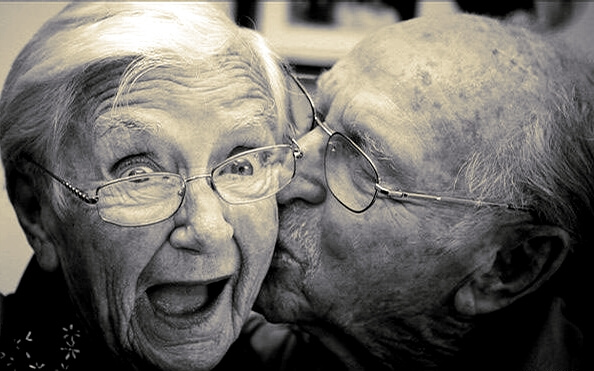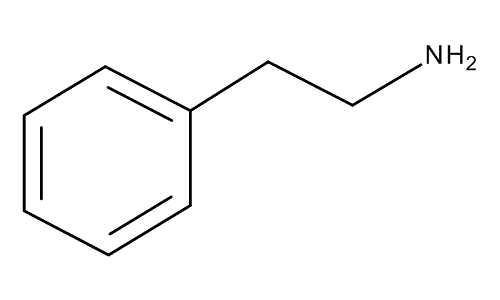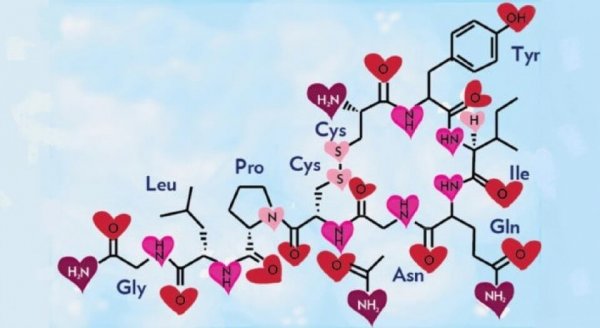The Chemistry of Love: Why Do We Fall in Love?


Written and verified by the psychologist Valeria Sabater
Albert Einstein once said that explaining what we feel towards that special person strictly in terms of the chemistry of love, is to take away all its magic.
But, whether we like it or not, there are actually processes like attraction or obsessive passion where neurochemistry is important.
It delineates a territory that’s quite fascinating and complex. And it also defines part of who we are.
Love, from a romantic or philosophical point of view, is something poets and writers talk about every day. We’d all love to sink ourselves into those literary worlds where they romanticize this kind of feeling.
It should be said, though, that it contains more mysteries than certainties. But when it comes to falling in love — from a biological point of view — neurologists are the ones who an give us the most accurate picture. They might be less evocative, but they’re more objective and real in the end.
“The meeting of two personalities is like the contact of two chemical substances: if there is any reaction, both are transformed.”
-C.G. Jung-
Even anthropologists give us an interesting perspective on it. It lines up nicely with the chemistry of love we know through neuroscience.
In fact, there’s one thing that’s always been captivating about this area of knowledge. It’s the idea of being able to identify the processes underlying those long-lasting relationships. People who somehow build a stable and happy bond.
Anthropologists explain that humanity seems to use three different brain “tendencies.” The first is the one where sexual impulse guides a lot of our behavior.
The second refers to “romantic love,” where we create relationships of dependence and a high emotional, personal cost.
The third focus is the one that shapes healthy attachment. It’s where the couple has a mutual understanding that both members benefit from.
Now, we want to do more than understand where stability and happiness in a relationship comes from. It’s something we’re all interested in. We’re talking about falling in love.
We’re talking about the chemistry of love. Specifically, the strange, intense, and confusing process that sometimes makes us set our eyes, mind, and heart on the worst person for us. Or on the other hand, the absolute best person for us…

The Chemistry of Love and Its Ingredients
Maybe you think falling in love is only explainable through a neurochemical lens. Or that attraction is the result of a formula whose variables line up with the chemistry of love and the neurotransmitters involved in the process. Where our impulsive brain orchestrates the magic, desire, obsession…
It’s not like that. Everyone one of us has specific, deep, idiosyncratic, and sometimes even unconscious preferences.
In fact, there’s clear evidence that we tend to fall in love with people who have similar characteristics. They have a similar level of intelligence, the same sense of humor, the same values…
But there’s something remarkable and fascinating here. We can be in a classroom with 30 people with similar characteristics as us. They might have similar tastes and equal values, and we’ll never fall in love with any of them.
The Indian poet and philosopher Kabir said the path of love is long, and there’s only space for one person in the heart. Then… what other factors put us in the spell we call the chemistry of love?
“Dopamine, norepinephrine, serotonin…We’re a natural drug factory when we fall in love.”
-Helen Fisher-
The Aroma of Genes
Intangible, invisible, and imperceptible. If we tell you right now that our genes give off a specific smell capable of awakening attraction between some people and not others, you may raise your eyebrows in skepticism.
- But there’s something other than our genes that gives off a specific smell. We’re not conscious of it, but it guides our patterns of attraction. It’s our immune system, and more specifically, our MHC proteins.
- These proteins have a very specific job to do in our bodies: they trigger our defensive reactions.
- We know, for example, that women feel unconsciously more attracted to men with a different immune system than them. It is smell that guides them in this process. If they prefer genetic profiles different from their own, there’s a reason. That is, if this couple has children, they’ll come with a more mixed genetic set.

Dopamine: I Feel Good With You, I “Need” to be With You and I Don’t Know Why
There might be an extremely attractive person in front of us, but there’s still something missing. They don’t make us feel good, the conversation doesn’t flow, we’re not in sync, and there’s no connection.
Many people will immediately say, “there’s no chemistry,” and they wouldn’t be wrong at all.
- The chemistry of love is real, and there’s one basic reason that’s true. Every emotion is triggered by a specific neurotransmitter. There’s a chemical component the brain will release with the right set of stimuli and more or less conscious factors.
- Dopamine, for example: the biological component that “lights us up.” It’s a chemical substance extremely related to pleasure and euphoria. Some people quickly turn into the object of our desire almost instinctively. Being with them gives us undeniable pleasure, a wonderful feeling, and occasionally blind attraction.
- Dopamine is a neurotransmitter that does double duty: it also plays the role of hormone. It works in a very powerful reward system. It’s so powerful that we have 5 different kinds of receptors for it in our brains.
Something we’ve all experienced at some point is the persistent need to be with one specific person and not another. Falling in love makes us selective.
It’s dopamine that forces us to focus “our whole world” around that specific someone. Even to the point of obsession.
Norepinephrine: Everything is More Intense With You
We know that a person loves us because they create a roller-coaster of chaotic, intense, contradictory, and sometimes even uncontrollable feelings.
Our hands sweat, we eat less, we sleep only a few hours or none, we think less clearly. In fact, almost without realizing, we turn into a little satellite. We orbit around one single thought: the idea of the person we love.
- Have we gone crazy? Absolutely. We’re under the control of norepinephrine, which stimulates adrenaline production. It;s what makes our heart beat faster, our hands sweat, and fully activates all our noradrenergic neurons.
- The noradrenaline system has just over 1,500 neurons on each side of the brain. It’s not much, but when they activate, they “go wild,” to put it one way. They cause an overwhelming feeling of joy, liveliness, and enormous jitters. They even deactivate our feeling of hunger or ability to fall asleep.
Sweetheart, You Trigger my “Phenylethylamine”
When we’re in love there’s an organic compound that completely takes us over: phenylethylamine.
As the word itself shows us, here we have an element that shares a lot of similarities with amphetamines. And combined with dopamine and serotonin, it makes the perfect recipe for a love straight from the movies.
- As an interesting fact, one food that’s famous for containing phenylethylamine is chocolate. But the concentration of it there isn’t as high as it is in cheese. In fact, phenylethylamine in chocolate metabolizes really fast compared to certain dairy products.
- Now, if you’re wondering about the exact role of this organic compound, we’ll just tell you it’s simply amazing. It’s like a biological device that tries to “intensify” all our emotions.
Phenylethylamine is like sugar in a drink, or the lacquer we put on a canvas: everything becomes more intense. It’s what intensifies the action of dopamine and serotonin. It’s what forms the real chemistry of love, making us feel happy, fulfilled, and incredibly motivated…

Serotonin and Oxytocin: Strengthening Our Love
There are three neurochemicals we’ve talked about by now: dopamine, norepinephrine, and phenylethylamine.
They’re the three with unquestionable power that determines the very beginning of falling in love. The place where desire, jitters, passion, and obsession guides us.
That definitely doesn’t mean that oxytocin and serotonin weren’t there in the first phase, because they were. But these two come into play a bit farther along.
This happens when both neurotransmitters start to intensify our bonds. In this way, they energize us to enter a more rewarding phase where we can strengthen our relationship.
Let’s look at it in more detail:
- Oxytocin is the hormone that makes up love with a “capital L.” And we’re not just talking about “falling in love,” or attraction (where the substances we’ve talked about come in.) We’re talking about the need to care for the person we love. The need to caress them, to be part of the person we love with a long term commitment.

- We can sum up serotonin with one single word: happiness. It plays a part in more than just the falling in love phase. It leads to a phase where we realize that being with that specific person means experiencing more intense happiness. So we have to invest effort and commitment in that relationship to keep up that positive emotional state.
- Serotonin brings us well-being when things are going well. It gives us optimism, a good mood, and satisfaction.
- But we might start to feel the other person distancing themselves. Or the relationship might get cold, or doesn’t go beyond the sexual level. In these cases, serotonin levels may plummet. This will sometimes bring us to a state of very intense defenselessness and anxiety. This is where depression can start to take hold.

The Beautiful Chemistry of Love
So to wrap up, the chemistry of love, whether we like it or not, orchestrates our behaviors. This is as true with falling in love as with the later phases. The ones where commitment and stability are built.
Also, Dr. Helen Fisher suggests in her work that human beings aren’t the only creatures able to fall in love. Just like Darwin himself suggested, in our world there are more than 100 species, including elephants, birds, and rodents, that choose a partner and stay with them for their whole life.
They feel what experts have labelled “a primitive romantic love,” but it’s still love…
It might be true that defining this universal emotion in chemical terms isn’t very romantic, like Einstein said. But, it’s what we all are in the end.
That is, an amazing web of cells, electric reactions, and nerve impulses that can bring us the most spectacular happiness…
Bibliographic References
Giuliano, F.; Allard J. (2001). Dopamine and sexual function. Int J Impot Press.
Sabelli H, Javaid J. Phenylethlyamine modulation of affect: therapeutic and diagnostic implications. Journal of Neuropsychiatry 1995; 7:6-14.
Fisher, H. (2004). Why We Love: The Nature and Chemistry of Romantic Love. New York: Henry Holt.
Garrido, José María (2013). La química del amor. Madrid. Chiado Editorial
All cited sources were thoroughly reviewed by our team to ensure their quality, reliability, currency, and validity. The bibliography of this article was considered reliable and of academic or scientific accuracy.
- Giuliano, F.; Allard J. (2001). Dopamine and sexual function. Int J Impot Press.
- Sabelli H, Javaid J. Phenylethlyamine modulation of affect: therapeutic and diagnostic implications. Journal of Neuropsychiatry 1995; 7:6-14.
- Fisher, H. (2004). Why We Love: The Nature and Chemistry of Romantic Love. New York: Henry Holt.
- Garrido, José María (2013). La química del amor. Madrid. Chiado Editorial
- Fisher, Helen (2009). Por qué amamos. Madrid: Taurus
This text is provided for informational purposes only and does not replace consultation with a professional. If in doubt, consult your specialist.








